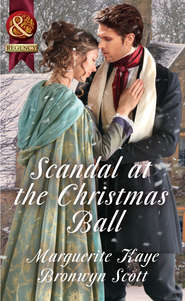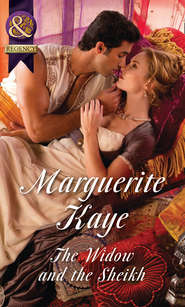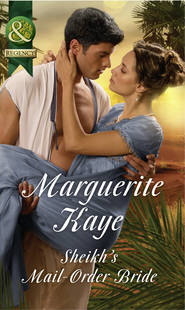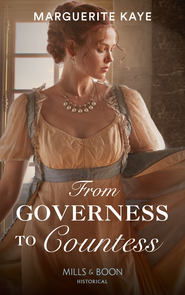По всем вопросам обращайтесь на: info@litportal.ru
(©) 2003-2024.
✖
Outrageous Confessions of Lady Deborah
Настройки чтения
Размер шрифта
Высота строк
Поля
‘Of some two years’ standing,’ the widow replied.
‘I can’t tell you how pleased I am to hear that.’ The words were out before he could stop them.
‘I doubt very much that the pleasure you take from my status could rival mine.’
‘That, if you don’t mind my saying so, was an even more telling remark than my own.’
Deborah coloured. ‘I am aware of that.’
‘It was not a love-match, then, I take it?’
‘No. Yes. I thought it was. I was just eighteen when we met—my head stuffed full of romantic fancies, as foolish and unworldly as it’s possible to imagine a person could be—and Jeremy was … seemed to be … well, he swept me off my feet, to put it in the sort of terms I’d have used myself then,’ Deborah said with a twisted smile. ‘When Jeremy proposed I thought all my birthdays had come at once. My guardian—my uncle—my parents died when I was very young—was only too glad to be able to wash his hands of me, so we were married three months after we met. I thought myself wildly in love, but it was all a sham. Jeremy was only interested in my money. Pathetic, isn’t it? I don’t know why I have told you all this, but you did ask.’
‘I think it’s sad, not pathetic. Were you very unhappy?’
Deborah shrugged. ‘I was very naïve and very set upon the match. I was not the only one who suffered as a result. I should never have married him. You know, this is all rather boring. Do you mind if we change the subject?’
Her husband sounded like a complete bastard. Elliot couldn’t understand why she was so determined to lay the blame on herself but, much as he wished to probe deeper, her closed look was back. He doubted he would get anywhere. ‘I beg your pardon,’ he said. ‘I didn’t mean to upset you.’
‘You didn’t,’ Deborah replied, tilting her chin and sniffing.
He wanted to kiss her then, for that defiant little look. Actually, he’d wanted to kiss her before that. ‘You know, you don’t look a bit like a dowager,’ Elliot said lightly. ‘Not a trace of grey hair, you don’t dab at your eyes with a black lace kerchief, or sniff at your smelling salts, and I’ve seen not a trace of an obnoxious little lap dog—unless he’s too precious to be allowed outside in the cold. The Dowager Countess of Kinsail.’ He shook his head. ‘No, it’s just not you.’
He was rewarded with a weak smile. ‘I prefer not to use the title. It’s Deborah Napier. And if I don’t look like a dowager you look even less like a housebreaker.’
‘Deborah. Now, that suits you. I am Elliot Marchmont, known to a very select few as the Peacock.’
‘What was it you stole, may I ask? Only Jacob has not let on, for some reason.’
‘For a very good reason,’ Elliot said drily. ‘I suppose there is no harm in telling you, since you already have my fate in your hands. It was a diamond. A large blue diamond, reputedly cut from the original French crown jewels. Kinsail came by it in what one might call a rather roundabout and unorthodox manner.’
‘You mean illegally? Jacob?’ Deborah squeaked.
‘Why do you look so surprised?’
‘Because he’s a sanctimonious, parsimonious prude who is never happier than when condemning others for lack of principles or morals or—well, anyway—’ She broke off, realising she had once again forgotten her golden rule of keeping her feelings strictly under wraps. This man unsettled her. ‘How did you know about it?’
‘I have my sources.’
‘Goodness. Do you mean those people they call fences? The ones who live in the Rookeries?’ Deborah asked, using with relish the cant she had only ever written.
‘I have to say, for an upstanding member of the aristocracy you seem to have an unhealthy interest in the seamy underbelly of society.’
‘I prefer to attribute it to a vivid imagination. Is it true what they say? That there is not a safe in England you cannot break?’
‘I have not yet encountered one,’ Elliot said, rather taken aback by her reaction, which seemed to be fascination rather than disapproval.
She was sitting on a bench in Hyde Park in broad daylight with the notorious Peacock. She should be calling the authorities. But instead of being in fear for her life she looked intrigued—excited, even. He had the distinct feeling that he had in Deborah Napier, Dowager Countess of Kinsail, met someone almost as subversive as he was himself.
‘I wish you would tell me all,’ she said, as if to confirm his thoughts. ‘Why do you do it? What is it like to pit your wits against the world as you do? Are you ever afraid of being caught?’
She had not asked him what he’d done with the diamond. Surely that was the first question any woman would have asked? But she seemed to have no real interest in the outcome, only the method. Just like him—well, at least in part.
‘There’s always a chance,’ Elliot replied, beguiled by the way her eyes lit up. ‘But if it was no risk it would not be worth doing. That is part of it for me—the excitement, knowing that one false move could be an end. There’s nothing like it. Not since …’
‘The army?’
‘How did you know that?’
‘The way you walk. The scars on your face.’ Deborah touched his brow, felt a jolt at the contact and drew her hand away quickly. ‘The first time I met you I thought you were a man used to being in command. Were you a soldier for long?’
‘Sixteen years. We ran off when I was just fifteen, me and my school friend Henry. Like you, he was orphaned, only his father had made no provision for him. In the same week he lost his family and his place at school. He was to be apprenticed to a lawyer.’ Elliot laughed. ‘Henry—a lawyer. Nothing could be more unlikely. He decided he would enlist instead, and I decided to go with him because by then I’d had enough of school and the notion of returning to the family estates and learning from my father how to take up the reins sounded like purgatory. So we ran off together, lied about our ages.’
‘What about your parents?’
‘My mother was dead. My father was not particularly happy, but we were not yet at war at that point, and I persuaded him that it would be good for me to learn some independence and some discipline. He bought me my first commission. Then the wars with Napoleon came, and by that time I’d discovered I had a talent for soldiering. The army was my family. In a way it was selfish of me, but by that time my loyalty to my men was such that—to be frank—I could not have left while there was a war to be won. To his enormous credit, my father supported me in that. I was a major when I resigned my commission after Waterloo. My only regret is that my father died just six months after I returned home.’
‘It must have been very difficult for you to adjust to civilian life after all that time.’
‘Yes, it was. Very.’ Her perception surprised Elliot. ‘People don’t really see that.’
‘People never do. I was nineteen when I married. When Jeremy died I found I had no idea who I was. Two years later I’m still not sure.’
‘I came home to take up the mantle of my family estates, to settle down into the quiet country life I’d joined up to avoid in the first place. Not much more than two years ago and I’m still not sure, either, who I am. I’m not a soldier any more, but I’m pretty damn sure that I’d die of boredom as a country squire.’
‘So you’ve taken up housebreaking instead? Is that it?’ Deborah asked, looking amused.
‘Partly.’
‘I wish I’d thought of something as exciting, but I lack the skills. How came you to acquire them? Is it part of basic army training, lock-picking?’
Elliot laughed. ‘No, but the British army is made up almost entirely of volunteers, you know. You’d be astonished at the skills one can learn from the men.’
‘Is that how you came about your contacts, too?’ Deborah chuckled. ‘I do not recall reading in the newspapers that the war against Napoleon was won by fences and pickpockets and the like.’
‘The war was won by poor bastards from all walks of life who enlisted because they had the misguided belief that at the end of it they would have made a better life for themselves and their families,’ Elliot said grimly. ‘The same poor bastards you see begging on the streets now—those of them who made it home.’
‘I’m sorry,’ Deborah said, taken aback by the sudden change in him. ‘I did not mean to make light of it. You must have lost some good friends.’
‘Yes.’ Surprised by the urge to confide in her, Elliot took a deep breath. ‘Sorry.’
‘You have no need to be. I should have known better. Time makes no difference with such scars, does it? A year, two—people think you should have forgotten.’
‘I won’t ever forget.’
‘Nor I,’ Deborah said softly.
She recognised that tone. And the look in his eyes—the darkness, suffering, guilt. She wondered what it was that had put it there. It went too deep to be solely down to the horrors of war. But though she was tempted to ask, she did not. Something about him—a shuttered look, a reticence—warned her off. Besides, questions begat questions. She did not wish to reveal why it was she understood him.











